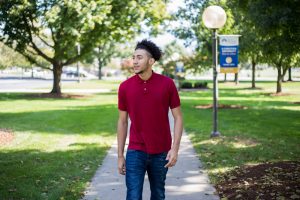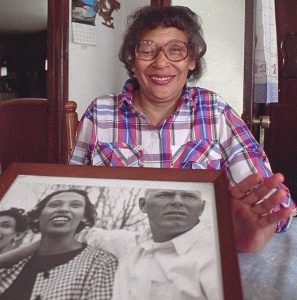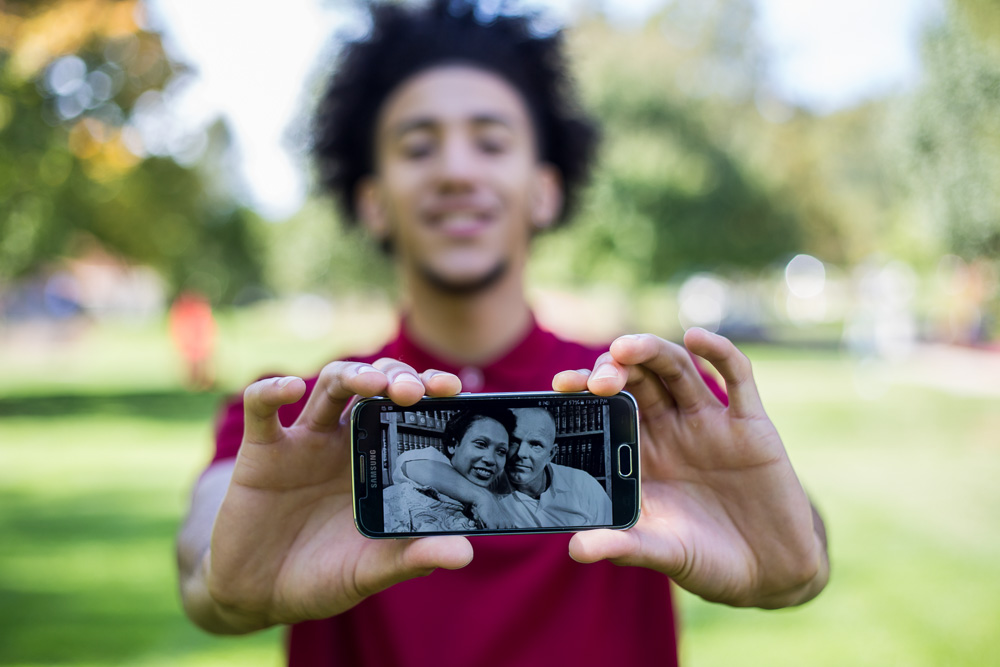In his native Caroline County, Virginia, Mark Loving II’s family name is well known. Beyond generations of rootedness, there is both a plaque at the courthouse and a historical marker about his family history. One reason why Mark came to Eastern Mennonite University: some anonymity in a rural landscape not dissimilar to home.
But being one of a crowd is shortly coming to an end for this sophomore kinesiology major who plays basketball and has plans to become a physical therapist. On Friday, Nov. 4, a movie will be released, the title of which is one word: his surname.

“I don’t think too many people know,” he said, “but that’s starting to change. The word has got out there.”
Challenging one of the nation’s oldest laws
Virginia’s law against interracial marriage was first established in 1624. More than 200 years later, in 1958, Richard Loving, a white man, and Mildred Jeter, a woman of the Native American race (Rappahannock Indian) decided to travel to Washington D.C. to marry. Virginia was still one of 24 states that barred marriage between the races.
Returning to Caroline County, the Lovings lived together for five weeks before they were arrested for violating Virginia’s Racial Integrity Act. Both Mildred and Richard spent time in prison before they agreed to leave Virginia and not return, together or separately, for 25 years.
After five unhappy years in Washington D.C., Mildred Loving wrote to the American Civil Liberties Union (ACLU), which eventually helped them to successfully challenge the law in the U.S. Supreme Court. The 1967 court case eventually led to the demise of miscegenation laws around the country.
Movie set to gain Oscar nods
Mark, the oldest great-grandchild of Mildred and Richard Loving, loves (and yes, that’s the right verb) just about every part of the new movie about his great-grandparents that premieres at the Charlottesville Film Festival tonight and opens nationwide on Friday [Nov. 4].
“I can’t pick a favorite part,” he said. “It’s my family story. I love it all. The whole situation that occurred disturbs me, but seeing these two loved ones never give up and fight … I would not be here, my grandma, father, siblings, uncles, aunt. ”
The Focus Features production, starring Joel Edgerton and Ruth Negga and filmed entirely in Virginia, earned excellent critical reviews at both the Cannes and Toronto film festivals. [Watch the trailer here.] The original story was shepherded by Martin Scorsese into the sights of director and screenwriter Jeff Nichols. The film was produced by Nancy Buirski, Sarah Green, Colin Firth, Ged Doherty, Marc Turtletaub, and Peter Saraf. The film was inspired by Buirski’s documentary The Loving Story.
Peggy Fortune, Mark’s grandmother, is the caretaker and guardian of the family history; her two brothers have both died, as did Mildred in 2008, when Mark was 11.
His grandmother’s endorsement in this project, Mark says, was important.
The parts he loves best, if he had to pick, are when his great grandfather, Richard, speaks. “He wasn’t a talkative person, so when he does say things … he means it,” says Mark, whose middle name, Perry, is shared with his father and great-grandfather.
One of Mark’s favorite lines is Richard Loving’s succinct criticism of the law they were fighting. The words were read by their attorney to the U.S. Supreme Court justices: “Just tell the court I love my wife.”
He also told a Life magazine reporter in 1966, “We have thought about other people, but we are not doing it just because somebody had to do it and we wanted to be the ones. We are doing it for us.”

A loving family
While Mark was close to his grandmother and spent every weekend at her house, he says she usually avoided talking about his great-grandfather. Richard Loving died in a car accident just six years after they moved back to Virginia; Mildred was blinded in one eye in that accident and never remarried.
Even their time in Virginia was not quite the life they’d hoped for.
“No peace,” Mark said, “no peace at all. They were always harassed. They didn’t want that at all. They just wanted to be together. And then they waited so long to be together and just six years later, he was gone. She had a lot of tragedy in her life. It hurts me to think about it.”
Mark was in the fifth grade when she died. He remembers her home filled with family and friends that day. After losing the matriarch of his family, he says “it just been different … We are missing just that one special piece.” He was also awakened to a family story that he hadn’t quite understood, but now continues to engage with.
One constant source of amazement, Mark says, is that their decision to fight to be together and to live together still has such long-reaching consequences and that so many Americans have been affected by those long-ago choices that his great-grandparents made.
Since 1967, interracial marriages have steadily risen in the United States. In 2013, a record high 12 percent of all U.S. married couple households are interracial or interethnic, according to Pew Research (nationwide, 6.9 percent of all married couples, not just newlyweds, are in interracial marriages). Recent news articles in the Washington Post and the L.A. Times highlight the stories of mixed-race couples who share the Loving legacy.
Family speaks to history
Mark Loving didn’t quite slide into anonymity at EMU. Professor Mark Sawin recalls seeing the Loving surname on the roster of his fall 2015 U.S. history course.
“On the first day, I approached him after class and asked if he was related to the Loving family made famous by the Supreme Court case,” Sawin recalls. “He beamed at the question and told me that he was their great-grandson. That was a wonderful connection … it’s always important for students to see that history is relevant to their lives, that it still influences their present and their future. For Mark, that connection is obvious.”
With the legacy comes responsibility. Currently, his grandmother Peggy, father Mark and cousin Sylvia handle media inquiries and the growing public interest about the story. Mark has been listening and learning. One day, he anticipates being a spokesperson. He carries a deep respect for the experiences of his great grandparents, their suffering, the sadness in their life, and for the responsibilities of sharing that story, of staying true to both their love and the pain they endured through social ostracism and then, early tragedy.
“They were courageous to take it that far, as far as they did,” he said. “All that loving … and we have the last name of Loving. We have that name for a reason.”

That was a very interesting article. I enjoyed it very much. I heard of the Loving story but did not make the connection with your family. Thank God for people like your Great grandparents. Making changes one step at a time. I will be going to see the film.
Thank you for sharing the article. We have come a long way since this Supreme Court decision. It makes me know that love does conquer a lot of obstacles if we are willing to sacrifice. The Lovings sacrificed a lot, but what they did not sacrifice was their love for each other. Out of their love grew change and progress in this world. Thank you Mr and Mrs Loving..????❤️
I was soooo excited to see that I share EMU with this family. I was approached by the local school division, several years ago and asked to speak at the MLK Program and was humbled beyond measure. They left the field wide open as to what I covered and I chose to showcase their story. At the time, I was in an interracial marriage and have 2 amazing children as a result of that time and I knew the relevance, first-hand. Their commitment and perseverance made it possible for me to have MY family. Even before the movie in the making, I was more than happy to educate my community about this fabulous story of unconditional love. As a middle-aged grad student, I won’t likely cross paths with Mark, but how exciting it is to know that Richard and Mildred’s family is among us!
This is a beautiful story, the film looks amazing as well. Thanks for sharing your story with us. If it wasn’t for your family and this Supreme Court decision some of my cousins may not be here today. May the Lord continue to bless the Loving family.
God bless you all!
They are together now
A story of true love and determination ❤️I look up to them both- I wish you all the best Mark